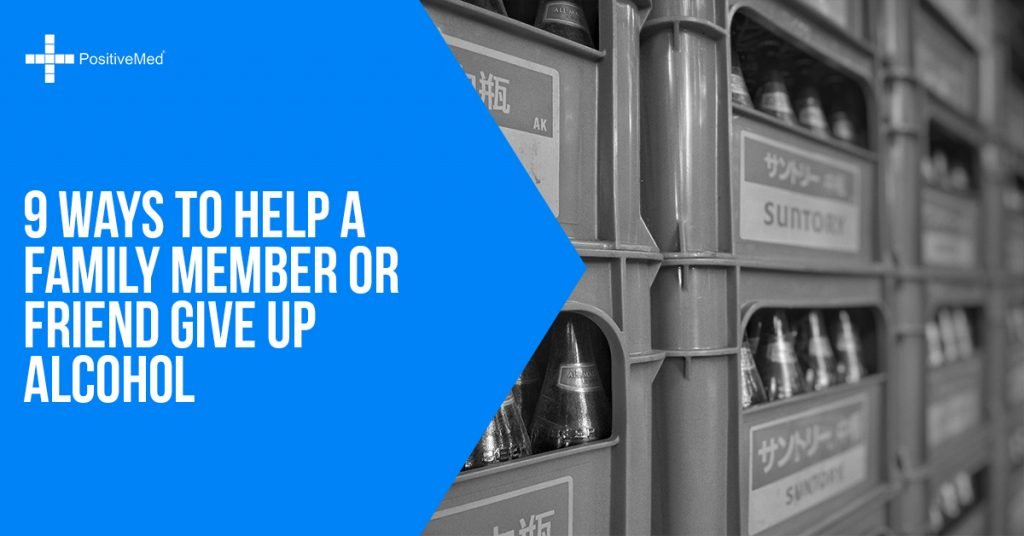It’s always a difficult thing watching your family members struggle. Whether because of general life stressors or illness, it is also hard to confront or offer them help. Alcohol abuse, while common, is a very sensitive subject. Often, the signs are clear when a friend is having one drink too many but it’s treated as a joke. Sometimes we ignore the obvious signs because they make us feel nervous or uncomfortable. It’s definitely important to reach out and help those in need, especially those closest to us. Here are nine ways you can help your loved one stop drinking alcohol.

• Understand that Alcoholism is a disease
If you’ve never gone through this situation, it will be a completely foreign concept. So before confronting your loved one, do your research. Learn about why and how people can develop into alcoholics. You can also learn where to direct them for professional support and figure out which method would be best. Use this information to strengthen your love and concern when you reach out to them. Be careful when you share all of this information that you don’t turn it into a lecture. You want to talk to them and make it okay for you to learn about this together.
• Make them comfortable and be honest
When it’s time to finally sit down and talk about the problem, try to schedule it in a familiar, private setting. This will allow the person to feel at ease. This will not be a short conversation, so be prepared to be patient and listen. Use the time to maybe uncover the real reasons behind the alcohol usage (whether it’s depression, anxiety or a coping mechanism for stress). If you think you might be too nervous, you can rehearse what you want to say before the meeting.
• Offer them support but not money
If you find yourself always rescuing or making constant excuses for your troubled family member following alcohol-related issues (bailing them out for D.U.I.s or being short on rent because they spent too much at bars), you can offer to help them. Offer them a place to stay or access to treatment. What you shouldn’t do is give them any money. Giving them financial support is called enabling. Enabling means that you’ll be fueling their bad habit. Likely, you will not be the only one to help them out in a pinch but it’s necessary for a little tough love sometimes.
• Don’t drink around them
This should be an obvious one, but if you know someone fighting a battle with the bottle, it’s best to keep it away. There’s nothing to be gained from tempting them. It’s just inconsiderate and a little cruel. After you’ve brought up a drinking problem, if you drink in front of them, they may take your words as a joke or not really anything serious.
• Don’t try to shame them into stopping
One tactic often used that fails is trying to create a sense of shame and guilt regarding the drinking problem. Whether by just openly judging them or making an ultimatum, this line of support is misguided. Oftentimes, this creates more stress and agitation for your loved one and forces them into even harder decisions. Instead of hurting them, reinforce the idea of open communication and that you will provide support.
• Be consistent
Once you’ve begun offering your help and pushing for a positive change, it is important that you don’t give up. It will be an exhausting process but sticking through until it’s done will be more beneficial to everyone involved. You can offer to help out with daily tasks (laundry, childcare, etc.) in order to give them the time they need to recover. Be mindful that once they enter into a therapist’s care or rehab, your support should not end. They’ll still need to know they have your love and care during their treatment.
• Confidentially enlist the help of other friends or family
Confronting a major issue like this one is definitely a daunting task. Try to arrange for more of your friends or family to join you for an intervention. By being able to support each other, you’ll be able to focus your energy and well-wishes on the person struggling. If you can’t get enough personal members, try reaching out to licensed professionals, like doctors or therapists.
• Reach out to Alcoholics Anonymous for help
If you find that you’re alone and don’t know how to raise your concerns, you can reach out to Alcoholics Anonymous. They offer a “12th step” call where at least two recovering members will join you for a meeting with your loved one. They’ll be able to relate more, having been through the experience and share their knowledge and guidance on getting past the alcoholism.
• Don’t blame yourself
While it might seem that you had an influence over your troubled loved one’s fate, this is not true. You are not responsible simply because you had a party and provided alcohol. You must realize that their problem is their own, not matter how badly you want to help them. The choice to continually abuse alcohol was the individual’s (and sometimes, it can even be linked to genetics). Another key aspect of this step is to take care of your own mental health so that you can continue to be supportive.
All in All
The road to recovery is long and will likely not be without obstacles. But it will more helpful to your loved one if you are they to support them through this process. Sometimes the strong bond of family or friendship will outshine the need for professional help. The key to helping your loved one through this struggle is to focus on the future and not the past. Don’t try to play the blame game. Just work together toward the common goal of restoring their health and quality of life. By using a variety of options, you can really help them and yourself.
Sasha Brown
Sasha is a widely experienced content writer with a zeal for living naturally. As a Certified Herbalist and mother of two children, she can offer you simple solutions on how to achieve a healthier lifestyle. She is a founder of www.voxnature.com and also writes for howtonight.com magazine.
Sasha is a widely experienced content writer with a zeal for living naturally. As a Certified Herbalist and mother of two children, she can offer you simple solutions on how to achieve a healthier lifestyle. She is a founder of www.voxnature.com and also writes for howtonight.com magazine.







